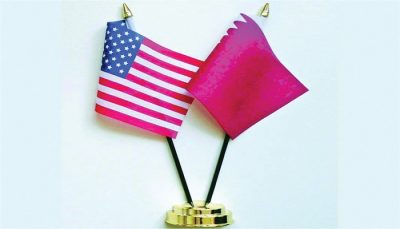US-Qatar Rise in Cooperation May be Related to Washington’s Energy Strategy

All Global Research articles can be read in 51 languages by activating the “Translate Website” drop down menu on the top banner of our home page (Desktop version).
To receive Global Research’s Daily Newsletter (selected articles), click here.
Visit and follow us on Instagram at @globalresearch_crg.
***
US-Qatar relations seem to be getting better and better. During a conversation at the White House with Qatari Emir Sheikh Tamim bin Hamad Al Thani, US President Joe Biden promised to elevate Qatar’s military status, considering it a major non-NATO ally. The measure favors the Qatari state as it allows the country access to a select sphere of the American arms market, with special prices and favorable tax conditions. In fact, this case looks like a real trade-off to encourage Qatar to play a major role in US energy strategy: Biden simply wants Doha to produce and export more and more gas to Europe in order to prevent international cooperation projects with Russia.
In recognition of the historic cooperation between both countries and the role played by Qatar as a rescuer of US troops fleeing Afghanistan during Taliban’s seizure of Kabul, Joe Biden decided to designate Doha as Major non-NATO Ally, a status that grants Qatar privileged access to special conditions in the trade of weapons and military equipment between the two countries, which makes the American proposal very profitable for the Qataris.
Also, more than economic, legal and fiscal privileges, the promotion to this status in NATO strengthens US-Qatar relations because it “guarantees” Doha the existence of solid ties of respect and mutual trust between the countries, encouraging the Qatari government to believe in a possible US cooperation and military assistance during an eventual conflict scenario in the future.
These were some of Biden’s words:
“I’m notifying Congress that I will designate Qatar as a major non-NATO ally to reflect the importance of our relationship; I think it’s long overdue (…) I am making this designation in recognition of Qatar’s many years of contributions to US-led efforts in the US Central Command area of responsibility and in recognition of our own national interest in deepening bilateral defense and security cooperation with the State of Qatar”.
There is clearly an interest on the part of Washington to make Doha a central agent in the current US anti-Russian strategy, especially with regard to the energy issue. One of the biggest difficulties seen by the US in its attempt to promote a global boycott against Russia is to replace the role played by Moscow in the energy supply of several countries – among them, many American allies. As one of the major global producers and exporters of natural gas, Qatar shows great strategic value to the US as it can be a key to encouraging more and more countries to stop buying gas from Russia.
Last week, the White House had already informed that the issue of energy supply would be the main topic of discussion during the visit of the Emir of Qatar. Washington has planned to diversify the energy sources of its partner countries, mainly on the European continent, which consumes most of Russian gas. Qatar is playing a key role in this game: Doha increases production and lowers prices for European countries to consume its gas. In return, Washington gives Doha the “guarantee” of military cooperation within NATO to ensure that the country remains safe and protected by the West from any possible reprisals for adhering to such a plan.
However, the Qatari government needs to analyze the proposal carefully, as there are several points that make this cooperation questionable in its purposes. Doha’s designation as a NATO ally is very profitable from a technological and economic point of view, as it gives access to the aforementioned military market. But such a measure means little from a realistic and pragmatic perspective, since, despite being considered an “ally”, the country that is outside NATO does not share the guarantees of protection enjoyed by the members of the alliance.
On the other hand, regardless of the military aid issue, designation as a non-NATO ally will make Doha adhere to all the alliance’s projects. In fact, accepting the new status of partner of the Western bloc, in this sense, will certainly involve a decrease in the important strategic ties that Doha has with Beijing, for example, considering that China is one of Washington’s biggest enemies. In other words, it is a position that demands more than it provides. By assuming closer ties with NATO, in short, Doha will be giving up a large part of its strategic autonomy and its ability to maintain ties with different powers.
Qatar will accept a prestigious position in the gas market and a high military status but will become dependent on the West to maintain its economic stability, ceasing to occupy the role of regional power with its own sovereign interests, which has been its main characteristic in recent years.
*
Note to readers: Please click the share buttons above or below. Follow us on Instagram, @globalresearch_crg. Forward this article to your email lists. Crosspost on your blog site, internet forums. etc.
Lucas Leiroz is a research fellow in international law at the Rural Federal University of Rio de Janeiro; geopolitical consultant.
Featured image is from https://www.qatar-tribune.com/

